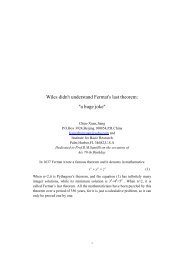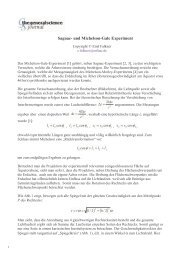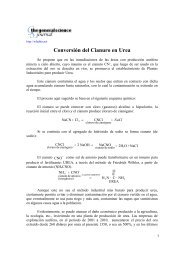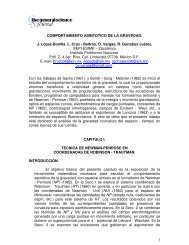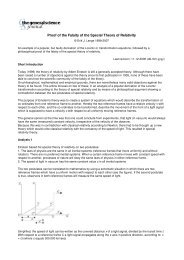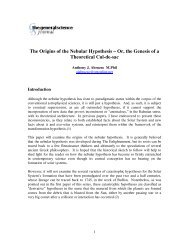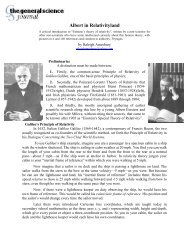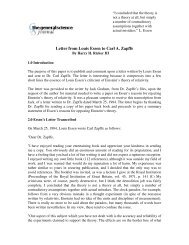MAGNETISM DURING THE SEVENTEENTH CENTURY HH Ricker III
MAGNETISM DURING THE SEVENTEENTH CENTURY HH Ricker III
MAGNETISM DURING THE SEVENTEENTH CENTURY HH Ricker III
Create successful ePaper yourself
Turn your PDF publications into a flip-book with our unique Google optimized e-Paper software.
“adored not only as the sole inventor of Magneticks, a new science to be added to the<br />
Bulk of learning, but as the Father of the new Philosophy; Cartesius being but a builder upon<br />
his experiments.” 28<br />
The unfortunate fact that the foundations for field theory provided by Gilbert were not extended<br />
or exploited by the English, is a mark against their scientific reputations. They were swept up in<br />
the enthusiasm for a new anti-aristotelian mechanical approach and failed to see the truth within<br />
the Gilbertian field theory.<br />
The approach used by the English mechanizers of magnetism was not to build a mechanical<br />
magnetic theory, that had already been done by Descartes and Gassendi, but to perform<br />
experiments which supported the claims of these mechanistic theories against those of which<br />
asserted the incorporeal action of the magnet. This negative approach was entirely successful,<br />
but ultimately destructive towards the goal of a successful theory of magnetism. The significance<br />
of the English approach lies in the body of magnetic experiments that was developed to refute<br />
the incorporeal interpretation of magnetic action.<br />
During the decade from 1650 to 1660, the English took aim at the incorporeal theories of<br />
magnetism using the weakness which was previously noticed, the changes in magnetization due<br />
to heating and mechanical deformation. This approach can be traced to Pierre Gassendi’s<br />
Philosophiae Epicuri Syntagma, published in 1649, where Gassendi briefly notes that evidence<br />
for the corpuscular theory of magnetism is provided by the decay of magnetic virtue with time,<br />
its destruction by heat, and by the differences or variations exhibited in magnetic strength. The<br />
idea was picked up by Walter Charleton who presented it as his first experimental proof that the<br />
magnetic virtue was caused by a “corporeal efflux.” According to Charleton in the Physiologia<br />
Epicuro-Gassendo-Charletonia published in 1654:<br />
”The materiality of the magnetic virtue is inferrible likewise from hence, that it decays in<br />
progress of time (as all Odours do) and is destroyed by fire, in a few minutes, and is capable of<br />
Rarity and Density (whence it is more potent near at hand, than at the extremes of it[s] sphere)<br />
all which are the proper and incommunicable Attributes of Corporeity.” 28<br />
Henry Power, a physician from Halifax and a supporter of Descartes magnetic theory, took up<br />
the challenge of extending Walter Charleton’s argument supporting materialistic magnetism by<br />
producing new experiments. Following the new inductive method, during the years 1656 to 1659<br />
he subjected magnets to a wide variety of harsh mechanical treatments. They were heated,<br />
cooled, struck, stroked, bored, and drilled. Anything that would justify a mechanical explanation<br />
was tried. The result was nine new demonstrations of the mechanical production of magnetism<br />
which were contained in a book on magnetism entitled Experimental Philosophy, The Third<br />
Book, Containing Experiments Magnetical: With a Confutation of Grandamicus, published under<br />
the auspices of the Royal Society in 1663. The most persuasive of these was described in<br />
Argument 8 as follows:<br />
“Take a rod of Iron (or a Puncheon) as before; heat it red-hot, and according to the laws in its<br />
refrigeration, you may endue this or that extreme with whether polarity you please; now<br />
afterwards by striking it with a Hammer in the same posture that it was cooled in, you may much



